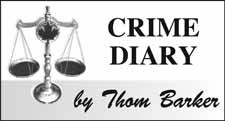The government of Saskatchewan last week implemented new impaired driving regulations including a zero tolerance policy for those in the graduated licencing program.
Drivers under 19, or with a graduated licence, will receive an automatic 60-day licence suspension for any blood-alcohol content (BAC) reading under .08. Police will also seize offenders' vehicles at the roadside and impound them for three days. Any driver with a BAC between .08 to .15 will also have his licence suspended until the offence is dealt with by the courts and have his vehicle impounded for 30 days.
Refusing a standard roadside sobriety test (SRST) also becomes illegal under the new regulations carrying the same penalties as failing a breathalyzer test.
One would think that even the old regulations would have been enough of a deterrence, although I suspect most people, who have not been charged or convicted of DUI, don't know just how far they went. I didn't before doing the research for this piece.
Let's review.
The legal BAC limit for experienced drivers is .08, but a reading between .04 and .08 lands you an immediate 24-hour licence suspension for a first offence. A second offence carries a 15-day suspension and requirement to complete SGI's Driver Without Impairment (DWI) course within 90 days. If you get caught a third time, it's a mandatory 90 days plus addiction screening and completion of an education or recovery program before you get your licence back.
That's fairly steep in itself, but once you breach .08, you're into Criminal Code territory. There are three basic charges, operating a vehicle while impaired, operating a vehicle with a BAC greater than .08 and refusing to provide a sample of breath, urine or blood. And, don't forget, the criminal code definition of "operating" includes "being in care or control," so you don't even have to be actually driving. All these offences carry the same penalties-refusing to blow will not get you off-including an automatic 90-day administrative driver's licence suspension while your case is before the courts.
For a first offence, if convicted, the minimum fine is $1,000 (with no maximum), plus another $500 penalty under SGI's Safe Driver Recognition Program. Oh, and let's not forget the victim surcharge, which just went up to 30 per cent and is now mandatory under new federal legislation. Finally once your licence suspension (minimum one year, maximum five years) is over, you have to take the $150 DWI course. If you're over .15-what is now commonly referred to across the country as Rob Ford-drunk-that's an aggravating factor, which will increase the penalties nine times out of 10.
For a second offence, you're going to jail for a minimum of 30 days up to 18 months and a third offence will net you a minimum four months.
That is, of course, if no one is hurt (maximum 10 years) or killed (maximum life). I don't even want to think about the mental anguish of having a person's bodily harm or death on my conscience for the rest of my life.
Finally, forget about getting away for a mid-winter break to Mexico, or even hopping across to North Dakota for a little pre-Christmas shopping. Both the United States and Mexico will refuse entry to Canadians with a DUI conviction. In fact, under Mexican immigration laws having a foreign conviction is itself and indictable offence.
Will the new Saskatchewan regulations help? Perhaps a little, but it hasn't really had that much of an impact in the past. As of 2009, the province had some of the strictest drunk driving laws in the country, but has consistently had the worst record of alcohol-related traffic deaths. We currently have more than triple the national average at 9.7 deaths per 100,000 population annually compared to 3.2.
Targeting specifically younger drivers with more penal consequences has helped both B.C. and Alberta lower their drunk driving fatalities over the past couple of years, but there are those who think the new Saskatchewan rules don't go far enough. The NDP wanted short-term impoundments for all drivers and MADD Canada was hoping the zero tolerance policy would be extended to all drivers 21-years and under.
I'm afraid even those measures would not be enough. Every Monday morning in Yorkton court the number of Criminal Code Section 253 charges leaps off the pages of the docket. Every week, new convicts walk out of that building on Smith Street with hefty fines, a criminal record and severe restrictions on their mobility. If the current consequences of driving under the influence are not enough, we need to start looking beyond legislation at making educational programs more effective and improving alternative transportation options for imbibers.




